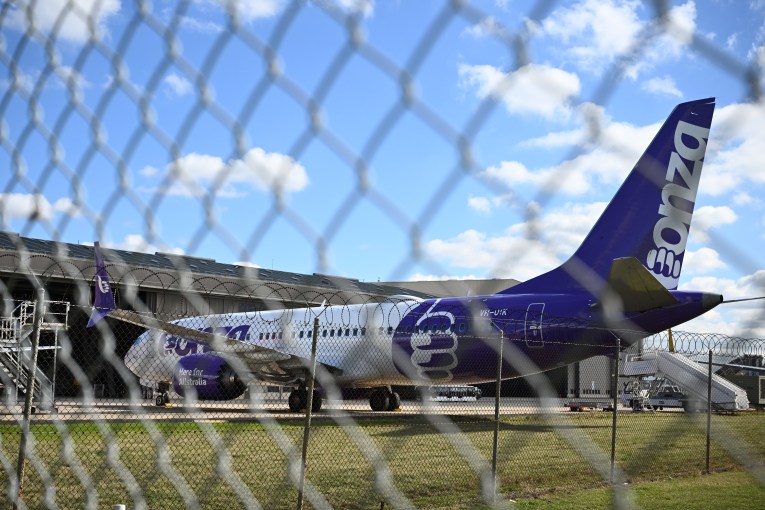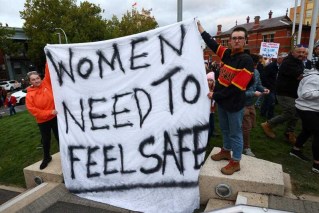Queens Birthday Honours: meet our new Dame
The Governor of New South Wales, Marie Bashir, has been appointed a Dame of the Order of Australia as part of the Queen’s Birthday honours.
More than 700 Australians have been recognised in the Queen’s Birthday honours this year.
Across 32 categories, 178 women and 393 men were selected for the honours, while a further 212 Australians are receiving recognition through military and meritorious awards.
Dame Bashir, who is being recognised for her commitment to improving mental health services and her support of tertiary education, is the second woman to receive the title since knight and dames honours were reintroduced by Prime Minister Tony Abbott earlier this year.
Former Governor-General Quentin Bryce was made the first Dame. Her replacement, former Defence Force chief Peter Cosgrove, was made the first Knight under the revived system.
The Companions in the Order of Australia
The scientist: Dr Megan Clark
The head of Australia’s research body is being made a Companion in the Order of Australia (AC) for her service to scientific research.
Starting her career in science as a geologist, Dr Clark worked for commercial mining companies before becoming the head of the CSIRO.
Dr Clark says she is honoured to receive the accolade and hopes it highlights the importance of science in Australia.
“I think it also highlights more broadly the dedicated technologists and scientists that we have out there in industry and research that are really working on the future,” she said.
“If the award highlights and puts a bit more spotlight on them, then I think that’s a good thing.”
The CSIRO is facing funding cuts, but Dr Clark says the organisation is committed to preparing Australia for the future.
“It’s very hard. For our scientists and our teams, who dedicate themselves to the future of this nation, it is not easy to have that reduction,” she said.
“We are certainly looking to rebuild CSIRO. We will be here for the long term and [will] make sure we are working on the biggest challenges that are facing this nation.”
Dr Clark is being recognised for her work “fostering innovation” and says the future of Australian science depends on how we encourage children to engage with science.
“I think we’ve all got an innate curiosity when we’re a kid, and it’s a matter of making sure we grow that curiosity, we encourage that curiosity and that we don’t work to push it down,” she said.
“There isn’t a kid that doesn’t muck around in a puddle, who looks at bugs as they walk past, who’s trying to work out how things work and that’s the curiosity of science.
“So how we encourage that and bring that forward will be important for the future of our country.
“The fundamental foundations have to be our education, our investments in science and innovation. These are going to be very important to Australia’s future and also how we contribute to a better future for humanity.”
The author and journalist: Les Carlyon
Les Carlyon, a former journalist who went on to write compelling accounts of Australia’s war history, has been recognised as a Companion of the Order of Australia (AC) for his eminent service to literature.
Carlyon started his career as a cadet journalist working for the Sun News Pictorial in 1960. He went on to serve as the editor of The Age and editor-in-chief of the Herald and Weekly Times.
In the 1990s, Carlyon worked as a freelance journalist for The Bulletin, The Sydney Morning Herald and the Perth Sunday Times.
He has also written a number of books about the horse racing industry and Australia’s war history.
In Gallipoli (2001) and The Great War (2006), Carlyon told the stories of ordinary, young Australians who went off and fought on the other side of the world, seeing horrendous things.
“The stories matter, I think, because they are a large part of our history,” he said.
“World War I is, without doubt, the biggest tragedy in Australia’s history with 61,000 [dead]. I think we’re still learning the facts of what really happened.
“There’s still a lot to come out on the Turkish side – there’s a bit [that has] come out in recent years that is very interesting – but there’s a lot still to come. Every little layer that comes out makes the story more nuanced.”
Carlyon says while there is a lot that can be learned from the lessons of war, Australia – and the world – was a very different place in the early 20th century.
“I think the important thing with it is to see its context – part of that is seeing it as an Australia that no longer exists,” he said.
“The Australia of 1914 was very much part of the British Empire … it was not multicultural – it was 90 to 95 per cent British-Celtic – and our outlook as a country was entirely different.
“We saw ourselves as Australians, but also British. You’re talking about an era and a country that is long gone.”
Carlyon says the stories of World War I, in particular, are still relevant to Australians as “acts of remembering”.
“I think it’s still relevant – World War I – to Australians today … to remember that generations before us made this monstrous sacrifice. And it wasn’t just the 61,000 killed; it was wives and children and all sorts of people who literally had their lives ruined by World War I,” he said.
“It’s just such a big piece of our history. We should know about it.
“I thought [being honoured] was something that happened to other people. I got something of a shock, I must say.”
The Lonely Planet founder: Tony Wheeler
Lonely Planet founder Tony Wheeler has been recognised as an Officer of the Order of Australia (AO) for his work as a publisher of travel guides and benefactor to Australian arts and aid organisations.
Mr Wheeler, who was born in England and grew up in Pakistan, travelled through south-east Asia to Australia, coming over on a boat from Indonesia in the 1970s.
Lonely Planet started when Wheeler and his wife Maureen wrote about their travels in a book called Across Asia On The Cheap.
BBC Worldwide acquired a 75 per cent share of the company in 2007 before becoming sole shareholders in 2011.
“I’m very pleased. It was a wonderful business. I enjoyed the whole time we were running it and a lot of other people did as well. You can’t ask for more than that,” Mr Wheeler said.
“There’s still so many places to go to. We’ve actually got a home in London and in Melbourne. I tell people these days that each year I spend six months in Melbourne, six months in London and six months everywhere else.
“One of the things about travel is that the more places you go to, the more places you find out you have not been to. My wish-list doesn’t get shorter. It gets longer each year.”
Wheeler has been a major supporter of Melbourne’s Wheeler Centre for Books, Writing and Ideas since 2008.
He started the Lonely Planet Foundation – now known as the Planet Wheeler Foundation – which invests money in health and education in south-east Asia, in the mid-1980s.
While his daughter now manages the day-to-day operations of the foundation, Mr Wheeler says he still helps out when he can.
“We’ve certainly seen things improve in many ways, but there’s still a long way to go,” he said.
“If I’m in a region where there is something we’re doing, I’ll always drop in to see it.
“We’ve got a lot of little projects. I turn up at the hospital or the school or whatever else we might be involved with.”
He says the famine in Ethiopia in the 1980s motivated him to get involved in philanthropy.
“We had the only guidebook to all of Africa. We thought, ‘Look, we’re making this money out of Africa, we should put some money back into it’,” he said.
The marathon runner: Steve Moneghetti
Marathon runner Steve Moneghetti has won many awards for his sporting achievements, but this year he is being honoured with an award of a different kind.
The Commonwealth Games gold medallist has been awarded a Member of the Order of Australia (AM).
Moneghetti, originally from Ballarat, says the award is a great honour.
“It’s a bit surreal and obviously it’s a great honour. I’m delighted and you hope you make a difference to your community, so it’s nice if the honour comes along,” he said.
“I find it hard to accept it because it’s not like you run a race and you’re on the dais.”
The 51-year-old is the chef de mission for Australia’s Commonwealth Games team and is heading to Glasgow soon for this year’s Games.
He also held the position at the 2010 Commonwealth Games in India.
“I like socialising. I like involving people and the enjoyment in getting smiles on people’s faces from success – not my success, but their success – and coming along on that journey as a team,” he said.
“That’s the thing I’ve delighted in being able to bring to people.”
Moneghetti says he wants to share his award with the many people who work behind the scenes in Australian sports.
“In marathon running … you train really hard, you do a lot of preparation and at the end of the day people pat you on the back for the result you get,” he said.
“They’re not patting you on the back when you’re doing a lot of the hard work along the way.
“It’s the same with people in life. I’m receiving this award but want to dedicate it to the people who don’t get a lot of the rewards.
“They do as much hard work and more behind the scenes, and then I get the public accolades – they often don’t get that.”
The child protection advocate: Hetty Johnston
Eighteen years ago, when Hetty Johnston learned her daughter had been sexually assaulted, she and her family had no-one to turn to.
Since then, Ms Johnson has dedicated her life to creating awareness of child sexual assault and providing support to victims and their families.
Her organisation Bravehearts, which was set up in 1997, works to prevent child sexual assault and has been a vocal advocacy group for victims.
Now Ms Johnston has been recognised for her work, being awarded the Member of the Order of Australia (AM).
The child protection advocate says the lack of support available to her when her own six-year-old daughter was assaulted is what drove her to set up the organisation.
“We had to find some way to solve that because you just don’t wish that on anybody,” she said.
“It was such a bad time. To not be able to get answers on how to help your child and help yourself to get through this, how to make sure your child doesn’t grow up to be that statistic – the drug user, the suicide victim or all sorts of things – was pretty horrendous.”
Ms Johnston says things have changed dramatically in the past two decades.
“It’s a whole new world for victims and survivors of sexual assault and for those who work with them,” she said.
“It’s a changing landscape. Finally we’ve broken the silence and now this is something governments are taking very seriously.”
Ms Johnston and her organisation are no strangers to controversy in their child protection mission.
She led a campaign against former governor-general Dr Peter Hollingworth’s handling of child sex abuse claims while he was the Anglican archbishop of Brisbane in the 1990s. The campaign ultimately led to his resignation in 2003.
“We’ve had to make some really controversial calls,” she said. “Yes, we’ve ruffled feathers, but it’s been worth it.”
The Indigenous opera singer: Deborah Cheetham
Aboriginal opera singer Deborah Cheetham is another Australian who has been recognised, receiving an Officer of the Order of Australia (AO) award.
The Aboriginal soprano, playwright, composer and actress has made a name for herself in the opera industry and is now working to promote other Indigenous artists to pursue their dreams.
The niece of iconic Indigenous musician Jimmy Little, Cheetham says she is honoured by the award.
“I think that this recognition gives me a further agency to promote this idea of a united Australia – an Australia that brings together its ancient history,” she said.
“I think this award allows me to have more conversations that help deepen people’s understanding of who we are and where we come from, and then perhaps where we might end up together.”
Cheetham has spent the past few years bringing together Australia’s first Indigenous opera Pecan Summer.
After the early success of the production, she established the Short Black Opera company, dedicated to the promotion of Indigenous opera singers.
“Short Black Opera is every waking thought for me,” she said.
“It has been together now for five years, it’s grown in that time … I wanted to secure the future for Aboriginal voices in opera.”
Originally from Nowra in New South Wales, Cheetham was taken from her Aboriginal parents when she was a child.
She says her white parents never tried to hide her Indigenous heritage from her, but there were parts of her Aboriginal history that she had not always known.
“If I’m sitting here today as an Aboriginal woman and I didn’t know my own history, then how much harder is it for a non-Aboriginal person to understand that history and the implications that that history has for us today in contemporary Australia?” she said.
“So I’m just trying to work to increase the awareness to deepen the knowledge of our shared history so that we can understand one another.”
The philanthropist: Betty Amsden
Philanthropist Betty Amsden, 87, is being recognised as an Officer of the Order of Australia (AO) for her service to the community and support of arts in Victoria.
Ms Amsden, who has built a name for herself as one of the country’s leading philanthropists, was listed by Forbes as one of 48 heroes of philanthropy.
Dubbed the $6 million woman, Ms Amsden has raised more than $6.6 million for the Arts Centre Melbourne.
She says she is very proud to receive the award.
“I’m very humbled by it. I never thought I’d reach this status,” she said.
“I think the responsibility of receiving this award is something that I have to really look after because it isn’t given lightly.”
Ms Amsden’s dedication to supporting the arts has seen her not only writing the cheques but involving herself in the workings of the Arts Centre Melbourne.
“I like to be involved in it … you get the passion from the kids who are doing it and receiving it and it’s a lovely feeling,” she said.
Ms Amsden says she has worked hard and lived a fortunate life and felt she needed to give something back.
“People don’t realise that you don’t get respect unless you earn it,” she said.
“I like to think that I’m a caring person, I like to feel proud of what I do,” she said.
“I’m very fortunate to be able to do what I do and it’s lovely to see the results … There are a lot of people who have supported me and that in itself is a wonderful, wonderful gift.”
The Seekers’ star: Judith Durham
Judith Durham, a founding member of the iconic Australian folk and pop band The Seekers, is being recognised for her contributions to music and not-for-profit organisations.
Durham, who has played with the band since 1962, is being made an Officer of the Order of Australia (AO), along with band-mates Athol Guy, Keith Potger and Bruce Woodley.
The Seekers have sold more than 50 million records and had six top-10 hits during the 1960s.
“We were in it at the time of a folk boom – literally it was folk and gospel music and [traditional] jazz that was all the rage at the beginning of the ’60s,” she said.
“That just preceded The Beatles’ phenomenal achievement.
“The fascinating thing though is that the essence of the way The Seekers performed, just with acoustic instruments … it’s all just singing in good tune … [is] a very, very simple approach.
“When you realise we were competing with the likes of The Rolling Stones and The Beatles, it just showed [that] at that time there was room for all sorts of music.
“All we did was get on a boat and sail to England and plan to come back home. No-one could have predicted that we could have become pop stars.”
The band has just returned from a tour in the United Kingdom as part of celebrations to mark its 50th anniversary.
“We were having our golden jubilee anniversary. That was the idea – to celebrate 50 years of being together,” she said.
“It’s been an extremely eventful 12 months in every respect. We wanted to make it a big celebration for the fans. It was really something special to be able to do that.








